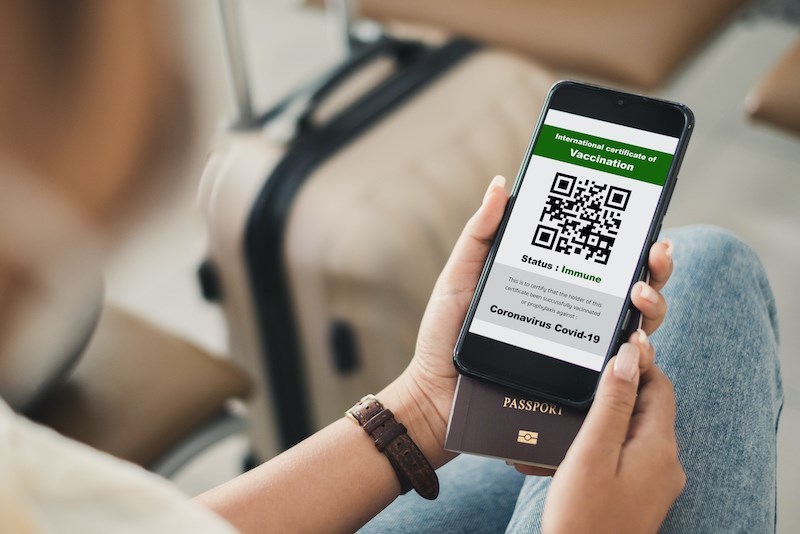A commentary by an infectious-diseases and critical-care medicine specialist in Nanaimo.
Those who refuse COVID-19 vaccination cite vaccine passports as a violation of their rights and freedoms. But every Canadian has the right to refuse vaccination, and their freedom of choice is inviolable.
However, a choice not to be vaccinated does not confer a liberty to put others at risk, thus infringing on others’ right to “life, liberty and security.”
How is that?
The current wave of COVID‑19 infections is driven by the more infectious Delta variant among unvaccinated people. And because of their lack of immunity, they are at greater risk of serious illness – which vaccines prevent in more than 90 per cent.
Consequently, hospitals and ICUs across Canada are inundated with critically ill unvaccinated patients with severe COVID-19. This has stretched health care resources to the breaking point — again. And this limits access for others and risks harm to everyone.
Vaccines have been the miracle of this pandemic, a marvel of modern science and ingenuity. COVID-19 vaccines are the most studied and among the most effective and safe forms of immunization ever developed. Billions of doses have been delivered with rare (though sometimes serious) adverse effects.
The effectiveness shown in early studies has been reproduced in multiple populations across the globe. There has been a marked reduction in infections, serious illness and death in highly immunized groups.
Although COVID-19 vaccines largely prevent serious illness and reduce likelihood of infection, they do not do so completely: Fully vaccinated individuals can still be infected with and transmit COVID-19, even if they don’t get ill.
The risk the unvaccinated pose is also in transmission to the vaccinated. Some vaccinees may yet be susceptible to serious COVID-19 illness. Or they may transmit it to others who are vulnerable — often unwittingly, as they are more likely to be asymptomatic.
And even if there is no particular susceptibility to severe COVID-19, the vaccine in the best circumstances cannot always prevent significant illness. So if 10 per cent of the vaccinated populace becomes infected, and even if only one per cent of those develop serious disease, the cases requiring hospital and ICU care would number in the thousands.
The consequence of COVID‑19 spreading unchecked through an immunized population would have a devastating effect on health-care resources to manage resulting severe illness. And this would further threaten access to health-care resources for all. We must therefore limit the dissemination of COVID-19. We have tolerated restrictions on our autonomy when we were all susceptible.
But now if we are going to protect liberty for most, we must reduce transmission among the group where infection is most prevalent, the unvaccinated. And that cannot be achieved, in the absence of immunization, without restriction on freedoms.
We accept limits on our liberties to enjoy certain privileges. This is largely because the good conferred by those restrictions to individual freedom is seen to be reasonable and justified for the benefit of society as a whole.
We accept, then, that we cannot enjoy the privilege of driving if we don’t wear seat belts or if we do so while intoxicated, in order to reduce the societal costs of injury and death.
The question is whether those restrictions are reasonable and proportionate. Since vaccine passports only apply to non-essential privileges, they seem measured. Given the present risk to viability of our health care system and to the public, they do not seem disproportionate.
Vaccine passports are not a breach of privacy. Again, there is no compulsion to share that information — vaccinated or not — if one chooses not to utilize non-essential services. They are a ticket to freedoms, not a violation of rights.
Proof of vaccination may be needed for certain types of employment. The viability of some businesses and the maintenance of essential services (such as hospitals) requires a healthy work force. And employers and businesses may be liable if they don’t take measures to protect the health of their employees and patrons.
Again, we accept with reasonable accommodation the setting of conditions of employment to protect the safety of workers and clientele, such as abiding by respectful workplace policies. Refusal to accept such conditions and consequent loss of employment is not a violation of rights.
Those opposed to vaccination and vaccination passports are very vocal. Our ICUs and health-care system are being overrun by COVID-19. If we don’t place restrictions on those fuelling the epidemic, then what suggestion do they have to manage it? A return to lockdowns?
What is their solution that respects the rights of all to “life, liberty and security”?




